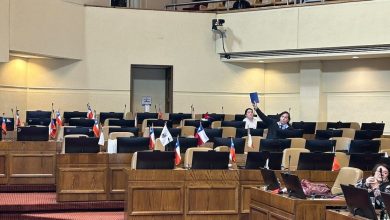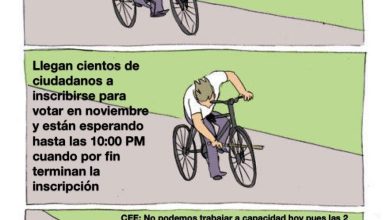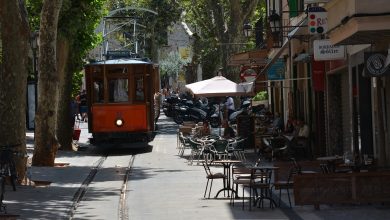El diario del lunes – Megathread semanal de política

El Diario del Lunes: Megathread Semanal de Política
Bienvenidos al Megathread Semanal de Política de El Diario del Lunes, tu fuente confiable de información y análisis sobre la actualidad política. Aquí encontrarás las últimas noticias, opiniones y debates en torno a los temas más relevantes de la semana en el ámbito político.
Lo más destacado de esta semana
- Elecciones regionales: Análisis de los resultados y sus implicaciones para el panorama político nacional.
- Reforma tributaria: Discusión en el Congreso y las distintas posturas de los partidos políticos.
- Relaciones internacionales: Visita del presidente a países aliados y acuerdos comerciales.
- Manifestaciones sociales: Protestas y demandas de diversos sectores de la sociedad.
Opinión y análisis
Nuestros columnistas y expertos en política ofrecen sus puntos de vista y análisis sobre los temas más relevantes:
- “La importancia de la participación ciudadana en las elecciones regionales” por [Nombre del columnista]
- “Desafíos y oportunidades de la reforma tributaria para el país” por [Nombre del experto]
- “El impacto de las relaciones internacionales en la economía nacional” por [Nombre del analista]
Participa en el debate
Queremos conocer tu opinión sobre los temas tratados en el Megathread Semanal de Política. Déjanos tus comentarios y únete al debate en nuestras redes sociales:
No te pierdas nuestra próxima edición del Megathread Semanal de Política, donde seguiremos analizando y debatiendo los temas más importantes de la actualidad política.
Abrimos este thread semanal para discutir las novedades relacionadas a la política de Uruguay y del mundo (favor mantener la conversación relevante a la temática del sub).
Recuerden que pueden usar la campanita para recibir notificaciones durante la semana.
[matched_content]
Here are some common social SEO tags you can add to your HTML to optimize your web pages for social media sharing:
-
Open Graph (OG) Tags:
- og:title: The title of your page as it should appear when shared on social media.
- og:description: A brief description of your page’s content.
- og:image: The URL of an image that represents your page when shared.
- og:url: The canonical URL of your page.
- og:type: The type of content (e.g., website, article, video).
- og:site_name: The name of your website.
-
Twitter Card Tags:
- twitter:card: The type of Twitter Card (e.g., summary, summary_large_image).
- twitter:title: The title of your page as it should appear on Twitter.
- twitter:description: A brief description of your page’s content for Twitter.
- twitter:image: The URL of an image to be used in the Twitter Card.
- twitter:site: Your website’s Twitter handle.
- twitter:creator: The Twitter handle of the content creator.
-
Schema.org Markup:
- itemprop="name": The name of your page or article.
- itemprop="description": A brief description of your page or article.
- itemprop="image": The URL of an image that represents your page or article.
- itemprop="author": The author of the content.
- itemprop="datePublished": The date the content was published.
- itemprop="publisher": The publisher of the content.
-
Facebook-specific Tags:
- fb:app_id: Your Facebook App ID, which connects your website to your Facebook app.
- fb:admins: The Facebook user IDs of the administrators of your page.
- LinkedIn-specific Tags:
- linkedin:company: The LinkedIn Company Page URL.
- linkedin:author: The LinkedIn profile URL of the content author.
Here’s an example of how you can include these tags in your HTML:
<!DOCTYPE html>
<html lang="en">
<head>
<meta charset="UTF-8">
<meta name="viewport" content="width=device-width, initial-scale=1.0">
<title>Your Page Title</title>
<!-- Open Graph Tags -->
<meta property="og:title" content="Your Page Title">
<meta property="og:description" content="Your page description">
<meta property="og:image" content="https://example.com/image.jpg">
<meta property="og:url" content="https://example.com/page">
<meta property="og:type" content="website">
<meta property="og:site_name" content="Your Website Name">
<!-- Twitter Card Tags -->
<meta name="twitter:card" content="summary_large_image">
<meta name="twitter:title" content="Your Page Title">
<meta name="twitter:description" content="Your page description">
<meta name="twitter:image" content="https://example.com/image.jpg">
<meta name="twitter:site" content="@YourTwitterHandle">
<meta name="twitter:creator" content="@AuthorTwitterHandle">
<!-- Schema.org Markup -->
<meta itemprop="name" content="Your Page Title">
<meta itemprop="description" content="Your page description">
<meta itemprop="image" content="https://example.com/image.jpg">
<meta itemprop="author" content="Author Name">
<meta itemprop="datePublished" content="2023-06-08">
<meta itemprop="publisher" content="Publisher Name">
<!-- Facebook-specific Tags -->
<meta property="fb:app_id" content="your-facebook-app-id">
<meta property="fb:admins" content="your-facebook-admin-id">
<!-- LinkedIn-specific Tags -->
<meta name="linkedin:company" content="https://www.linkedin.com/company/your-company">
<meta name="linkedin:author" content="https://www.linkedin.com/in/author-profile">
</head>
<body>
<!-- Your page content goes here -->
</body>
</html>Remember to replace the placeholder values with your actual content and URLs. By including these social SEO tags, you can optimize how your web pages appear when shared on various social media platforms, improving click-through rates and engagement.



